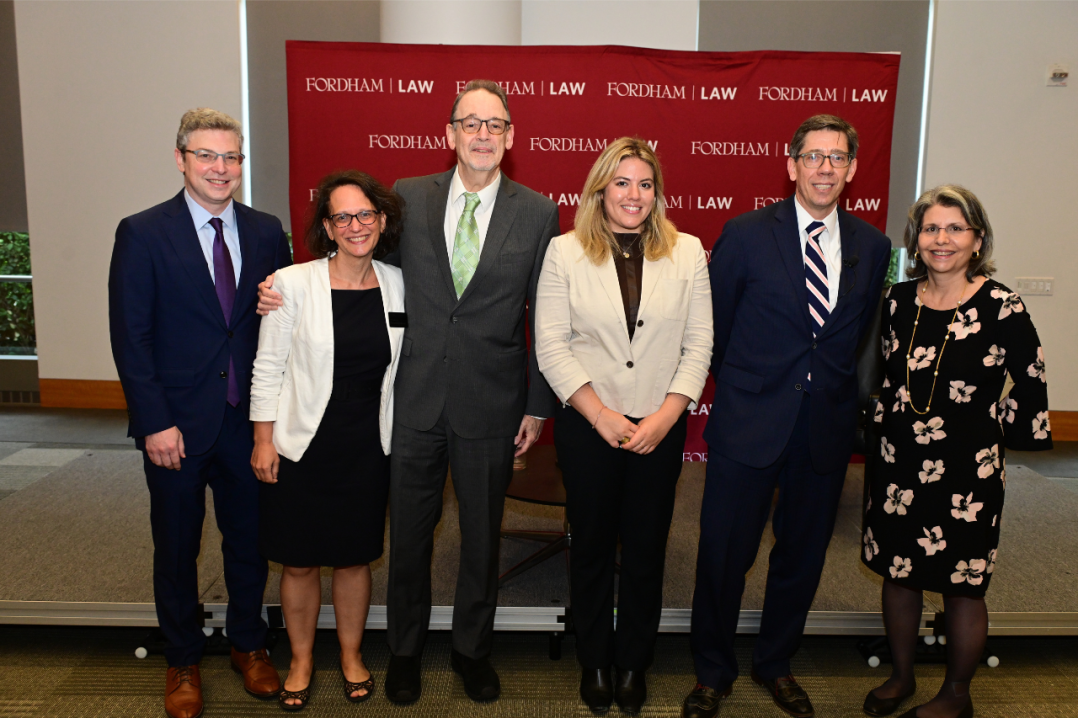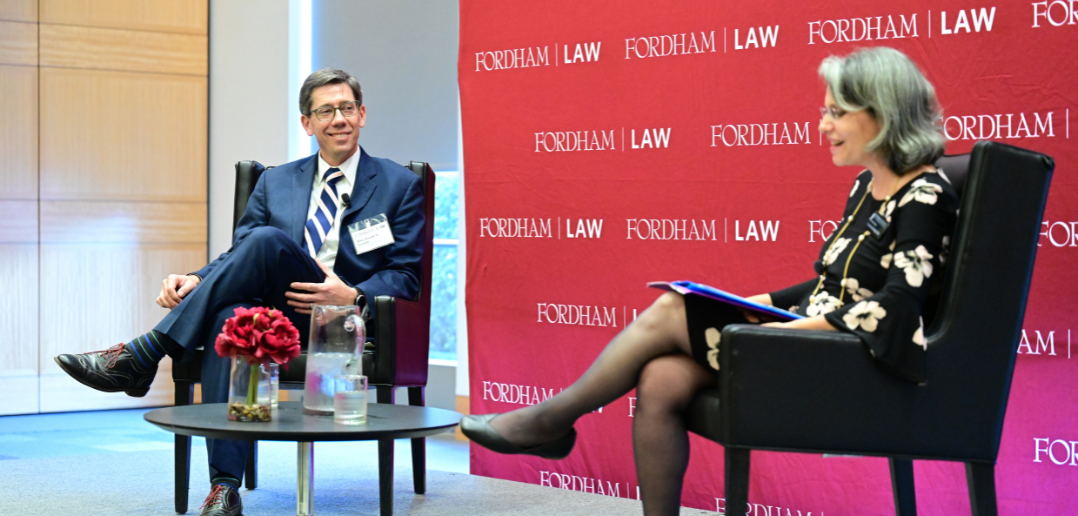The path to the bench for Judge Joseph Laroski ’97 began when he was a young boy looking out at the ships from the bench near his New Jersey family home. By the time he was unanimously confirmed as a judge in the U.S. Court of International Trade in February, he developed extensive experience representing the United States in trade negotiations involving markets through the Pacific Rim, Europe, and Africa, as well as litigating cases on behalf of clients that produced commodities ranging from outboard motors and steel to shrimp and live swine.
Laroski returned to Fordham Law School on Sep. 17 for an engaging fireside chat led by Suzanne Endrizzi ’96, assistant dean of the Center for Judicial Events & Clerkships (CJEC), to an audience filled with faculty, staff, students, and alumni.
Laroski spoke of his career path, the cyclical nature of international trade law, and the work of the Court of International Trade. He also gave advice to the law students in the audience.
“The discussion with Judge Laroski was akin to a master class in trade law, it was an incredible opportunity for our community to hear about this important area of the law from the perspective of all sides—government and private practice and the judiciary—and how instrumental it is to the workings of our economy,” said Endrizzi.
He said, “When I was in law school, there was this sense that you got plucked by a firm, you worked hard and did your job, you’re partner six years down the road, everything’s great, and that’s it—that you can’t pivot and you can’t find another way in [if you want to pursue another path]. But there’s always another way in. I often tell people, ‘Find the path.’ You can look at people’s biographies and try to see what path speaks to you.”
Laroski provided insight into his time as deputy assistant secretary for policy and negotiations and as director of policy for the undersecretary of commerce for international trade at the U.S. Department of Commerce, International Trade Administration, from 2017 to 2021.
As deputy assistant secretary, Laroski oversaw the enforcement and administration of U.S. antidumping duty and countervailing duty laws. He assisted U.S. companies and their workers by combating unfair foreign trade practices—ensuring compliance by foreign governments with U.S. trade agreements—and addressing unfair application of trade remedies by foreign governments.
“I knew I would be joining an administration that would treat trade law like a sandbox, dusting off old laws, finding other ways to address the most burning trade issues that hadn’t been solved by the current approach,” Laroski said of his decision to pivot back to the government sector. “I had a chance to see the full array of what the U.S. government does in commercial diplomacy and trade litigation.”

Earlier in his career Laroski served as associate general counsel in the Office of the U.S. Trade Representative and in the U.S. International Trade Commission. He was lead counsel for the United States in numerous dispute settlement proceedings before the World Trade Organization, including successful U.S. challenges to the Chinese application of antidumping and countervailing duty measures on U.S. grain-oriented electrical steel products and Chinese subsidies for indigenous Chinese-branded products. He also worked in private practice at King and Spalding and as an associate at Vinson & Elkins, Willkie, Farr & Gallagher, and Skadden, Arps, Slate, Meagher & Flom. Laroski served as a law clerk for Judge Dominick L. DiCarlo on the U.S. Court of International Trade before joining Skadden & Arps.
“You get to learn different aspects of trade law when you litigate different commodities—the calculation of cost of production, the way you determine whether a company is dumping [i.e. illegally pricing] its product here by virtue of the nature of the market,” Laroski said. “In moving from representing the domestic industry to representing foreign producers, I was building my toolkit. ‘I know how to pick apart the foreign producer’s responses to the government, but now I’m going to learn how to build up that same response.’”
Laroski joins two other Fordham Law alumni nominated to the federal judiciary since 2022: Judge Maria Araújo Kahn ’89, who was confirmed to the U.S. Court of Appeals for the Second Circuit in March 2023, and Judge Robert Kirsch ’91, who was confirmed to the U.S. District Court for the District of New Jersey in May 2023. Before Judge Laroski joined the Court, Fordham had only one other alumnus on the Court: Paul Peter Rao ’23 who was appointed to the US Customs Court by President Truman in 1948, served as Chief Judge from 1965-71, and remained on the Court until 1988 (it was renamed the Court of International Trade in 1980). Laroski currently sits in the judicial seat previously occupied by Judge Rao.
He told the students and young alumni in the audience, “It’s always easiest to get help when you know what you want. And if you’re afraid to say it, or if you just don’t know, find the mentors that will help you get there. Talk to whomever—a professor, practitioner, the government agency you want to work for. If you’ve named what you want, they can send you in a direction.”
“Judge Laroski shared valuable insights with the Fordham Law community, about the importance of finding your own professional path as well as appreciating opportunities in the practice of trade law,” added Professor James Brudney, Joseph Crowley Chair in Labor and Employment Law and CJEC faculty director.
View more photos from the event below:


